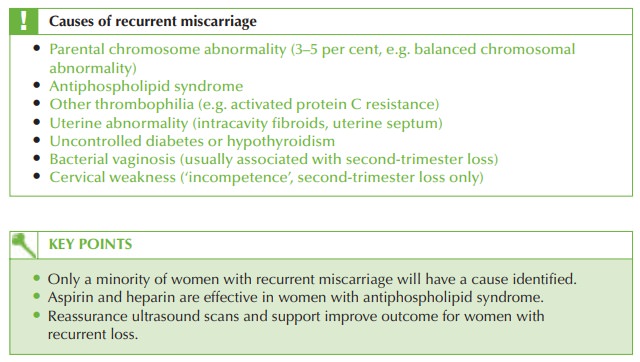Chapter: Case Study in Obstetrics and Gynaecology: General Gynaecology
Case Study Reports: Recurrent Miscarriage
RECURRENT MISCARRIAGE
History
A
34-year-old woman is referred from the emergency
room with vaginal
bleeding at 6 weeks
and 5 days’ gestation. Bleeding
started 2 days ago and was initially spotting but has now
increased so that
she needs to change a sanitary towel
regularly. There is a mild dull lower abdominal pain.
She
normally has regular
28-day cycle. In the past she has used the combined oral con-
traceptive pill but
stopped 3 years
ago when she
and her partner
decided to start
a family.
She
is gravida 3 para 0. Her first
pregnancy ended in a complete
miscarriage 2 years
ago. Five months ago she had a missed
miscarriage at 9 weeks and required ERPC (evacuation
of retained products of conception).
There is no gynaecological history of note.
Medically she is fit and healthy, except
for mild asthma for which she takes inhalers.
The
woman’s mother died from a pulmonary embolism
after her last child. Her brother
also had a deep venous
thrombosis at the
age of 29 years. Her
sister has two
children, both born preterm
because of severe pre-eclampsia.
Examination
The
abdomen is non-distended but tender suprapubically. The cervical os is open and
products of conception are removed
from the os and sent for histological examination.
The bleeding subsequently settles.

Questions
·
What is the likely
underlying diagnosis for the recurrent miscarriages?
·
What further investigation should be performed?
·
How should this patient be managed?
ANSWER
Raised anticardiolipin antibodies
and lupus anticoagulant are suggestive of antiphospho- lipid syndrome.

Thus in this
case the diagnosis must be confirmed by a second
positive anticardiolipin test after at least 6 weeks. She should also be tested
for antinuclear and anti-double-stranded
DNA antibodies as antiphospholipid syndrome is often secondary to systemic
lupus erythematosus (SLE).
Management
Oral low-dose aspirin and
low-molecular-weight subcutaneous heparin
from the time
of a positive pregnancy test should be given in subsequent pregnancies to improve the
likeli- hood of a successful live birth.
Psychological support should be given with regular reassurance ultrasound scans in the first
trimester. There
is evidence that shows repeated
ultrasound scans for reassurance alone improve the outcome after recurrent miscarriage.

Related Topics